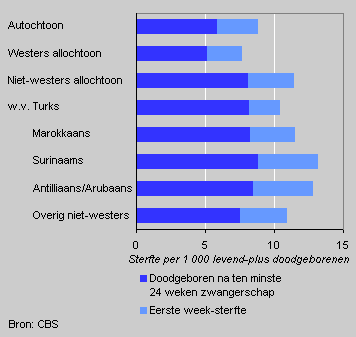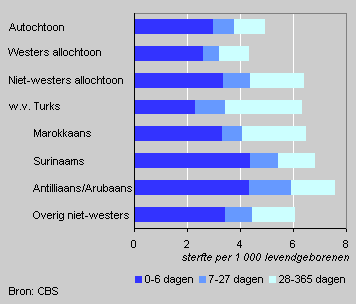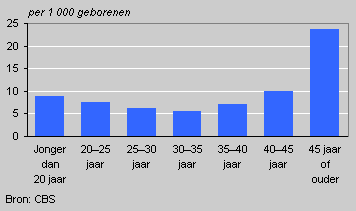Unfavourable development in mortality risk of newborns

In the Netherlands both perinatal mortality and infant mortality have decreased substantially in the last decades. However, since the eighties the decrease in perinatal mortality has levelled off, causing the Netherlands to drop a number of places in the European ranking on this aspect.
An unfavourable combination of factors is the underlying cause of this development. For example, relatively many foreigners from countries with an above average risk of perinatal mortality live in the Netherlands. Furthermore Dutch women are having their first babies at older and older ages and the number of multiple births is increasing faster than in other countries.
Perinatal mortality by ethnic background, 1997-2002

Higher risk for non-western babies
The group of foreigners with a higher risk of perinatal mortality make up an above average part of the population in the Netherlands. For all non-western foreigners together, the risk of perinatal mortality is nearly 30 percent higher than for native Dutch babies.
The difference is caused by difference in the risk of dying in the first seven days after birth. This first-week mortality is most unfavourable for Surinamese and Antillean babies. It is the decrease in first week deaths that has stagnated in the Netherlands more strongly than in other countries in the European Union (EU-15).
Infant mortality by baby’s ethnic origin and age at death, 1997-2002

As far as infant mortality is concerned, the differences between ethnic groups are largest in the period after the first four weeks of life. The mortality rates for Turkish and Moroccan babies are the most unfavourable: they run more than double the risk of native Dutch babies of dying between 4 and 52 weeks of age.
Older mothers and multiple births
Older mothers have an above average risk of giving birth to a stillborn baby. In the last decades, the average age at which women in the Netherlands have their first baby has risen sharply. Dutch mothers are now among the oldest in the world.
Number of stillbirths, by mother’s age, 1996-2003

Twin births also have an effect on mortality rates: twins have about a four times higher risk of perinatal mortality than single babies. At the moment, about one in 27 newborn babies are a twin, twice as many as in the mid-seventies. About 10 percent of total infant mortality concerns multiple births.
Other risk factors
Other risk factors include smoking during pregnancy, risk-taking sexual behaviour and a blood relationship between parents. In addition to these factors, in the Netherlands doctors are more hesitant about using prenatal diagnostics, and in the case of extremely premature births, babies do not always receive the most modern treatment as a matter of course. These considerations have also had effects on the development of perinatal mortality.
Joop Garssen and Anouschka van der Meulen